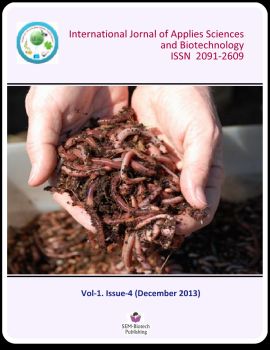Seroprevalence 0f Dengue Virus Infection in Nepal
DOI:
https://doi.org/10.3126/ijasbt.v1i4.9135Keywords:
Dengue fever, IgM ELISA, Terai regionAbstract
Dengue Virus infection is an emerging mosquito-borne disease. It is a global health problem and its expanding endemicity towards new territories is a serious concern. Relatively a new disease in Nepalese context, dengue abruptly appeared as massive outbreak in 2010, merely four years after its first introduction. It is a nagging public health problem in the low lands of Terai, expanding to new areas of Nepal in recent years. A cross-sectional study was conducted to determine anti-Dengue IgM positive rate in Lumbini, Dhading and Chitwan district. The study was carried from June 2012 to November 2012. The total number of Serum samples was collected from 275 patients visiting hospitals with history of fever, headache and suspected DF. The samples were examined by ELISA. The anti-Dengue IgM positivity was found to be 29.09 %. The positive rate was highest in Dhading (70.37%) followed by Bharatpur (37.6%) and Lumbini (11.38%). The Dengue positive cases were higher in males (32.5 %) than female (24.8 %). The highest positive cases (41.6%) were from age group less than 15 years. Dengue has substantial expansion in Western and Far Western Terai region of Nepal which was limited to the middle Terai region in the past and mostly infects older people.
DOI: http://dx.doi.org/10.3126/ijasbt.v1i4.9135
Int J Appl Sci Biotechnol, Vol. 1(4): 224-227




